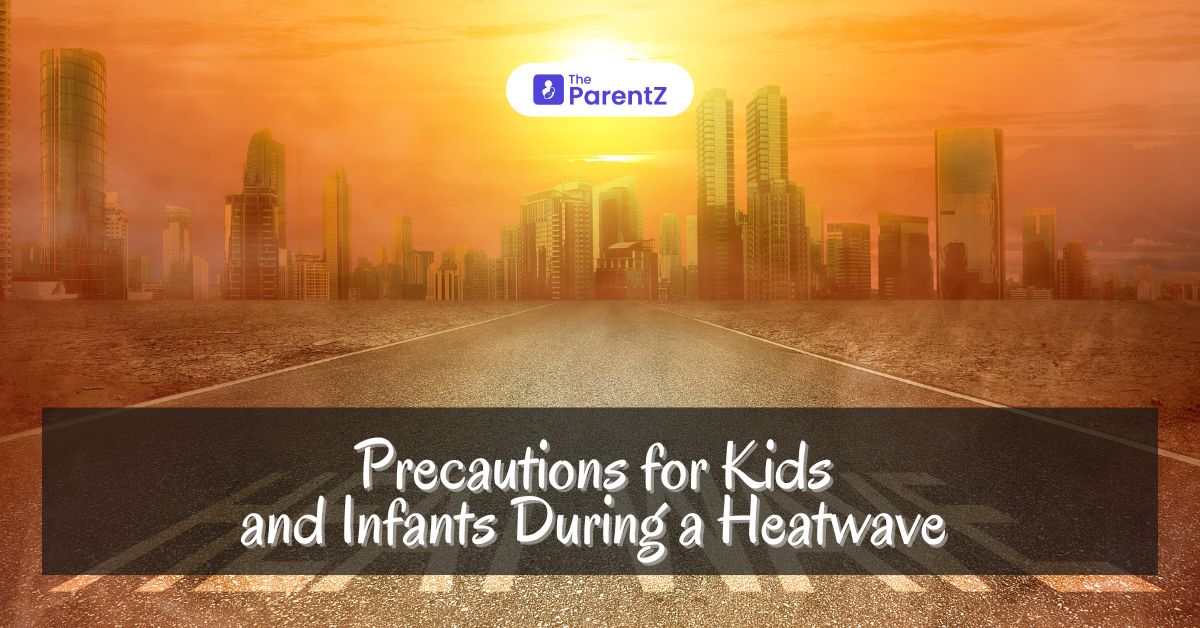There are significant risks to children and infants, who are more vulnerable to high temperatures than adults. Taking the right precautions can help prevent heat-related illnesses and ensure your little ones stay safe and comfortable.
Here’s a comprehensive guide on how to protect kids and infants during a heatwave.
1. Stay Hydrated: Ensure Constant Fluid Intake
Importance of Hydration: Children and infants are more prone to dehydration, which can happen quickly during a heatwave. Dehydration can lead to serious health issues like heat exhaustion and heat stroke.
Tips for Staying Hydrated:
- Frequent Water Breaks: Encourage children to drink water regularly throughout the day, even if they don’t feel thirsty.
- Breastfeeding and Formula: For infants, continue regular breastfeeding or formula feeding. Offer additional fluids if recommended by your pediatrician. NOTE: Children under 6 months should not be given any additional additional fluids besides breastmilk.
- Hydrating Foods: Offer hydrating snacks such as watermelon, cucumbers, and oranges, which have high water content.
- Avoid Sugary Drinks: Limit intake of sugary drinks and sodas as they can increase dehydration.
2. Stay Cool Indoors: Limit Outdoor Activities
Indoor Safety: During peak heat hours (10 a.m. to 4 p.m.), it’s best to keep children and infants indoors where it’s cooler.
Creating a Cool Indoor Environment:
- Air Conditioning: Use air conditioning to maintain a comfortable indoor temperature. If you don’t have AC, visit places like malls, libraries, or community centers that are air-conditioned.
- Fans: Use fans to circulate air, but never point them directly at infants.
- Cool Baths: Regularly give cool baths or use cool, damp cloths to help lower body temperature.
3. Dress Appropriately: Choose the Right Clothing
Avoid Overdressing: Overdressing can trap heat and increase the risk of overheating.
Appropriate Clothing:
- Lightweight and Breathable: Dress kids and infants in lightweight, loose-fitting clothes made from natural fibers like cotton.
- Light Colors: Choose light-colored clothing that reflects sunlight.
- Hats and Sunglasses: Use wide-brimmed hats and sunglasses for sun protection when going outside.
4. Protect from Sun Exposure: Use Sun Protection
Sun Safety: Sunburn can increase the risk of dehydration and heat-related illnesses.
Sun Protection Tips:
- Sunscreen: Apply a broad-spectrum sunscreen with at least SPF 30 on exposed skin. Reapply every two hours and after swimming or sweating.
- Shade: Use strollers with sunshades or umbrellas to protect infants from direct sunlight.
- Avoid Peak Sun Hours: Try to schedule outdoor activities for early morning or late afternoon when the sun is less intense.
5. Monitor for Signs of Heat-Related Illnesses: Stay Vigilant
Recognizing Symptoms: Early detection of heat-related illnesses can prevent serious complications.
Signs to Watch For:
- Heat Exhaustion: Symptoms include heavy sweating, weakness, dizziness, nausea, and headache.
- Heat Stroke: Symptoms include hot, dry skin, rapid pulse, confusion, and loss of consciousness. Heat stroke is a medical emergency—call 911 immediately if you suspect it.
What to Do:
- Move to a Cool Place: If a child shows signs of heat exhaustion, move them to a cooler place immediately.
- Hydrate: Offer water or an electrolyte solution.
- Cool Down: Use cool, damp cloths or a cool bath to lower body temperature. For infants, use a cool washcloth on their skin.
6. Plan Ahead: Prepare for Emergencies
Emergency Preparedness: Being prepared can make all the difference in an emergency situation.
Preparation Tips:
- Emergency Contacts: Keep a list of emergency contacts and your pediatrician’s phone number handy.
- First Aid Kit: Have a well-stocked first aid kit that includes supplies for treating heat-related illnesses including ORS and Electrolytes
- Emergency Plan: Develop an emergency plan that includes steps to take if your child exhibits signs of heat stroke or severe dehydration.
Indian Emergency Numbers:
- Emergency Services (Police, Fire, Ambulance): 112
- National Emergency Number: 108
- Child Helpline: 1098
- Medical Helpline: 102
7. Travel Safely: Never Leave Children in Cars
Car Safety: Cars can heat up rapidly, posing a severe risk to children and infants left inside.
Safety Measures:
- Never Leave Unattended: Never leave children or infants unattended in a parked car, even for a short period.
- Check the Back Seat: Always check the back seat before locking the car to ensure no child is left behind.
- Travel Timing: Plan car trips during cooler parts of the day and ensure the car is well-ventilated.
Additional Tips for Keeping Kids Cool in a Heatwave
- Stay Hydrated: Ensure kids drink plenty of water throughout the day to stay hydrated. Dehydration can quickly lead to heat exhaustion or heat stroke.
- Seek Shade: Encourage playtime in shaded areas, especially during peak sun hours (10 a.m. to 4 p.m.). Setting up a kiddie pool or water play area in the shade can provide fun and cooling relief.
- Use Sunscreen: Apply a broad-spectrum sunscreen with at least SPF 30 to protect kids’ skin from harmful UV rays. Reapply every two hours and after swimming or sweating.
- Cool Showers: Regular cool showers or baths can help lower body temperature and refresh your child. A quick rinse in cool water can be particularly effective after outdoor activities.
- Frozen Treats: Offer frozen treats like homemade popsicles or fruit slushies to help cool them down from the inside.
- Cool Towels: Keep damp, cool towels in the fridge and drape them around your child’s neck or wrists for quick cooling relief.
Conclusion
Protecting kids and infants during a heatwave requires vigilance and proactive measures. Ensuring proper hydration, staying cool indoors, dressing appropriately, using sun protection, monitoring for heat-related illnesses, preparing for emergencies, and practicing car safety are essential steps. By taking these precautions, you can help your children stay safe and comfortable during the hottest days. Stay cool and stay safe!








Be the first one to comment on this story.